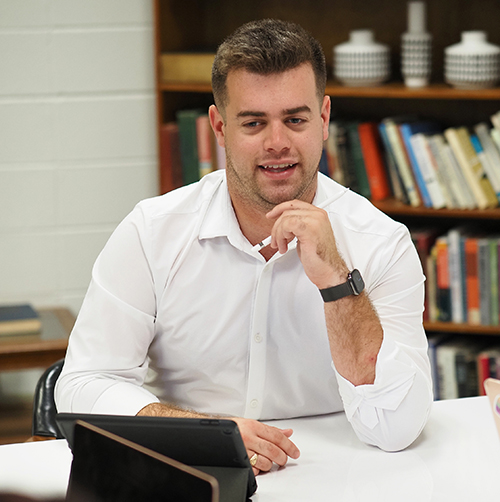Master's in Communication

The Master of Arts in Communication integrates theoretical and research components of mass, interpersonal and organizational communication, preparing students for work and further academic studies. We accept students with a variety of undergraduate degrees and professional experiences.
Careers in Communication
A master's degree in communication provides opportunities for students to pursue careers in a variety of industries or advance themselves in their current communication career. Graduates typically land jobs as account executives, media planners, marketing and communication directors, public information officers, public relations officers, brand managers and digital strategists. Many communication professionals work for nonprofits, educational institutions, entertainment businesses, healthcare, agencies, private businesses, government organizations and more.
Master’s Program Experience
Graduate faculty in the department of communication engage students to think critically about the communication revolution by sharing top-tier research training and recent professional experience. From day one, students are encouraged to gain hands-on training with real clients, internships, and networking at national conferences that will help build a competitive portfolio and professional contacts.
Graduate students in the program support and work with each other. Some students have an opportunity to teach public speaking courses and work on research with a mentor.
Graduate Courses
- CA 500 Foundation of Graduate Studies
- CA 501 Qualitative Research Methods
- CA 502 Communication Theory
- CA 503 Quantitative Research Methods
- CA 510 Persuasion in Professional Communication
- CA 511 Theoretical Foundations in Interpersonal Communication
- CA 530 Analysis of Communication in Organizations
- CA 545 Communication Ethics
- CA 549 Media Effects
- CA 555 Corporate and Public Communication Law
- CA 560 Social Media Management
- CA 570 Audience Dynamics
- CA 576 Historical Perspectives of Strategic Communication
- CA 585 Reputation Management
- CA 587 Tideline Student Agency
- CA 590 Special Topics in Communication
- CA 594 Directed Study in Communication
- CA 596 Professional Studies - Internship
- CA 599 Thesis

“My time as a graduate student in the Department of Communication has transformed me professionally and personally.” - Caleb Helms.
Admission
A bachelor’s degree from an institution accredited by the appropriate United States accrediting agency or equivalent for international institutions.
Official copies of undergraduate transcripts.
Applicants to graduate programs in Arts and Sciences typically have a minimum GPA of at least a 3.0 on all undergraduate work. In exceptional cases, applicants may be considered with at least a 2.5 GPA on all undergraduate work, or at least a 2.75 GPA on the last 60 hours of undergraduate work.
For applicants with less than a GPA of 2.5, the following graduate exam scores are required for regular admission:
- GRE - The required score is 297 or more combined points on the quantitative and verbal portions.
- GMAT - A combined score of 1000 or more when calculated as follows: 200 x undergraduate
GPA + GMAT score. - Earned graduate degree - An earned graduate degree may substitute for graduate entry exam scores. Students must submit a written request along with evidence of the degree to the graduate coordinator for review.
International Admission
- International students must submit documentation of TOEFL test scores of 250 on computer-based test or 100 on internet-based test, or a minimum score of 6 on the IELTS or 100 on Duolingo.
- A documented evaluation by the USA host department to be conducted by video teleconference or telephone
- Students who are required to take the English Language Proficiency Examination and whose scores suggest an English language deficiency must take the appropriate English as a Second Language courses. These courses are not counted as part of the 33-hour degree program.
Non-Degree Admission
Students may complete up to 15 hours without formal admission to the program. Students choosing this option will apply to be admitted as “A&S Non-Degree graduate” from the list of possible programs in the application menu.
The program provides a thesis or non-thesis option. The non-thesis curriculum consists of 33 credit hours, including a 6-hour core and 27 hours of elective courses. The thesis curriculum consists of 33 credit hours, including a 6-hour core, 21 hours of elective courses, and 6 credit hours toward completion of a thesis.
The deadline for thesis proposal defense is the last day of the class of the first semester enrolled in thesis hours. The thesis needs to be defended two weeks before the graduate school deadline to allow sufficient time to make proposed changes suggested by the thesis departmental committee.
For information about communication graduate assistantships, prospective students can click here. You may also contact our Graduate Coordinator, Dr. Jung Hwa Choi.






